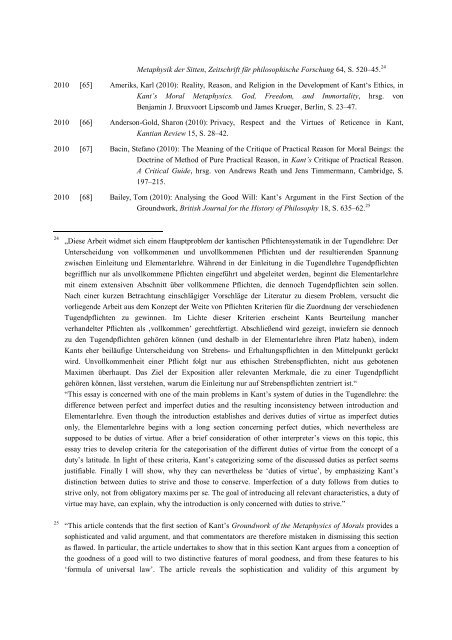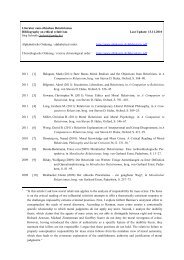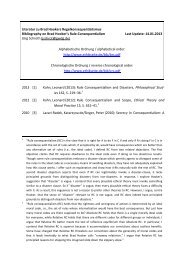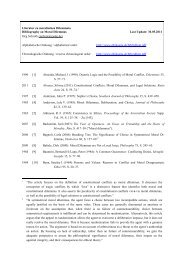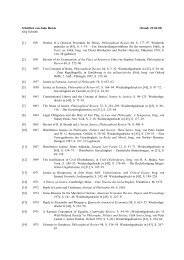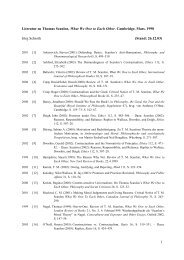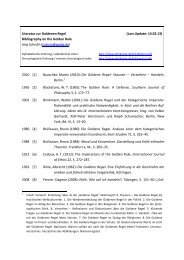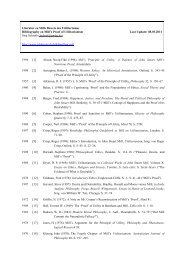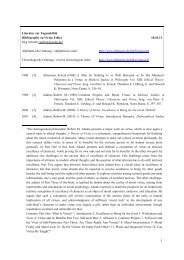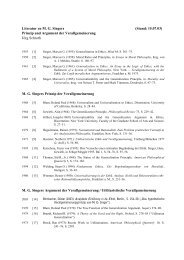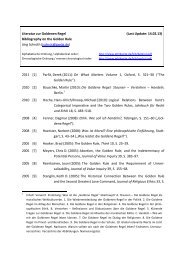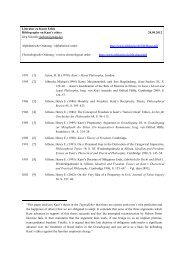Chronologische - Ethikseite
Chronologische - Ethikseite
Chronologische - Ethikseite
You also want an ePaper? Increase the reach of your titles
YUMPU automatically turns print PDFs into web optimized ePapers that Google loves.
Metaphysik der Sitten, Zeitschrift für philosophische Forschung 64, S. 520–45. 24<br />
2010 [65] Ameriks, Karl (2010): Reality, Reason, and Religion in the Development of Kant‘s Ethics, in<br />
Kant’s Moral Metaphysics. God, Freedom, and Immortality, hrsg. von<br />
Benjamin J. Bruxvoort Lipscomb und James Krueger, Berlin, S. 23–47.<br />
2010 [66] Anderson-Gold, Sharon (2010): Privacy, Respect and the Virtues of Reticence in Kant,<br />
Kantian Review 15, S. 28–42.<br />
2010 [67] Bacin, Stefano (2010): The Meaning of the Critique of Practical Reason for Moral Beings: the<br />
Doctrine of Method of Pure Practical Reason, in Kant’s Critique of Practical Reason.<br />
A Critical Guide, hrsg. von Andrews Reath und Jens Timmermann, Cambridge, S.<br />
197–215.<br />
2010 [68] Bailey, Tom (2010): Analysing the Good Will: Kant’s Argument in the First Section of the<br />
Groundwork, British Journal for the History of Philosophy 18, S. 635–62. 25<br />
24 „Diese Arbeit widmet sich einem Hauptproblem der kantischen Pflichtensystematik in der Tugendlehre: Der<br />
Unterscheidung von vollkommenen und unvollkommenen Pflichten und der resultierenden Spannung<br />
zwischen Einleitung und Elementarlehre. Während in der Einleitung in die Tugendlehre Tugendpflichten<br />
begrifflich nur als unvollkommene Pflichten eingeführt und abgeleitet werden, beginnt die Elementarlehre<br />
mit einem extensiven Abschnitt über vollkommene Pflichten, die dennoch Tugendpflichten sein sollen.<br />
Nach einer kurzen Betrachtung einschlägiger Vorschläge der Literatur zu diesem Problem, versucht die<br />
vorliegende Arbeit aus dem Konzept der Weite von Pflichten Kriterien für die Zuordnung der verschiedenen<br />
Tugendpflichten zu gewinnen. Im Lichte dieser Kriterien erscheint Kants Beurteilung mancher<br />
verhandelter Pflichten als ‚vollkommen’ gerechtfertigt. Abschließend wird gezeigt, inwiefern sie dennoch<br />
zu den Tugendpflichten gehören können (und deshalb in der Elementarlehre ihren Platz haben), indem<br />
Kants eher beiläufige Unterscheidung von Strebens- und Erhaltungspflichten in den Mittelpunkt gerückt<br />
wird. Unvollkommenheit einer Pflicht folgt nur aus ethischen Strebenspflichten, nicht aus gebotenen<br />
Maximen überhaupt. Das Ziel der Exposition aller relevanten Merkmale, die zu einer Tugendpflicht<br />
gehören können, lässt verstehen, warum die Einleitung nur auf Strebenspflichten zentriert ist.“<br />
“This essay is concerned with one of the main problems in Kant’s system of duties in the Tugendlehre: the<br />
difference between perfect and imperfect duties and the resulting inconsistency between introduction and<br />
Elementarlehre. Even though the introduction establishes and derives duties of virtue as imperfect duties<br />
only, the Elementarlehre begins with a long section concerning perfect duties, which nevertheless are<br />
supposed to be duties of virtue. After a brief consideration of other interpreter’s views on this topic, this<br />
essay tries to develop criteria for the categorisation of the different duties of virtue from the concept of a<br />
duty’s latitude. In light of these criteria, Kant’s categorizing some of the discussed duties as perfect seems<br />
justifiable. Finally I will show, why they can nevertheless be ‘duties of virtue’, by emphasizing Kant’s<br />
distinction between duties to strive and those to conserve. Imperfection of a duty follows from duties to<br />
strive only, not from obligatory maxims per se. The goal of introducing all relevant characteristics, a duty of<br />
virtue may have, can explain, why the introduction is only concerned with duties to strive.”<br />
25 “This article contends that the first section of Kant’s Groundwork of the Metaphysics of Morals provides a<br />
sophisticated and valid argument, and that commentators are therefore mistaken in dismissing this section<br />
as flawed. In particular, the article undertakes to show that in this section Kant argues from a conception of<br />
the goodness of a good will to two distinctive features of moral goodness, and from these features to his<br />
‘formula of universal law’. The article reveals the sophistication and validity of this argument by


